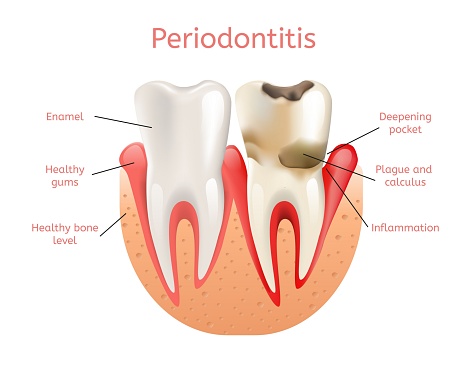FAQs
What is gum disease and how does it lead to tooth loss?
Gum disease, or periodontal disease, is an infection of the gums that can progress to affect the jawbone and supporting structures of the teeth. In advanced stages, gum disease can weaken the bone, causing teeth to loosen in their sockets and, in some cases, require extraction.
Can gum disease be treated to avoid tooth loss?
Yes, gum disease can often be managed and treated to prevent tooth loss. Regular periodontal treatments, professional cleanings, and consistent at-home oral care can help control the symptoms of gum disease and stop its progression.
When is tooth extraction necessary for gum disease?
Tooth extraction becomes necessary when gum disease advances to the point where the jawbone is too weak, or the infection has caused severe damage to the tooth’s supporting structures. If a tooth becomes loose and cannot be stabilized, extraction may be the best option.
What are the replacement options for teeth lost due to gum disease?
Teeth lost due to gum disease can be replaced with dental implants, fixed bridges, or partial dentures. Our team at United Smile Centres can help you determine the best option for restoring your smile and maintaining oral health.
How can I prevent gum disease from worsening?
Preventing gum disease from worsening requires consistent professional treatments, following a personalized periodontal care plan, and maintaining excellent at-home oral hygiene. If you notice changes in your teeth or gums, it’s important to consult your dentist promptly.
What are the signs that gum disease is getting worse?
Signs that gum disease may be worsening include increased gum swelling, bleeding, receding gums, loose teeth, bad breath, and changes in your bite. If you experience any of these symptoms, consult your dentist or our office for timely treatment.


 Getting teeth extracted is relatively common when you reach the advanced stages of gum disease. However, it does not always need to happen. There are steps that can be taken to try and save some of the teeth affected by this disease, but those steps are not always very successful. It is important that you know that if you do not have your teeth properly cared for once gum disease starts, chances are, you will face extractions in a short amount of time.
Getting teeth extracted is relatively common when you reach the advanced stages of gum disease. However, it does not always need to happen. There are steps that can be taken to try and save some of the teeth affected by this disease, but those steps are not always very successful. It is important that you know that if you do not have your teeth properly cared for once gum disease starts, chances are, you will face extractions in a short amount of time. 